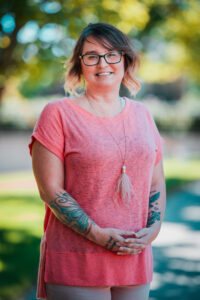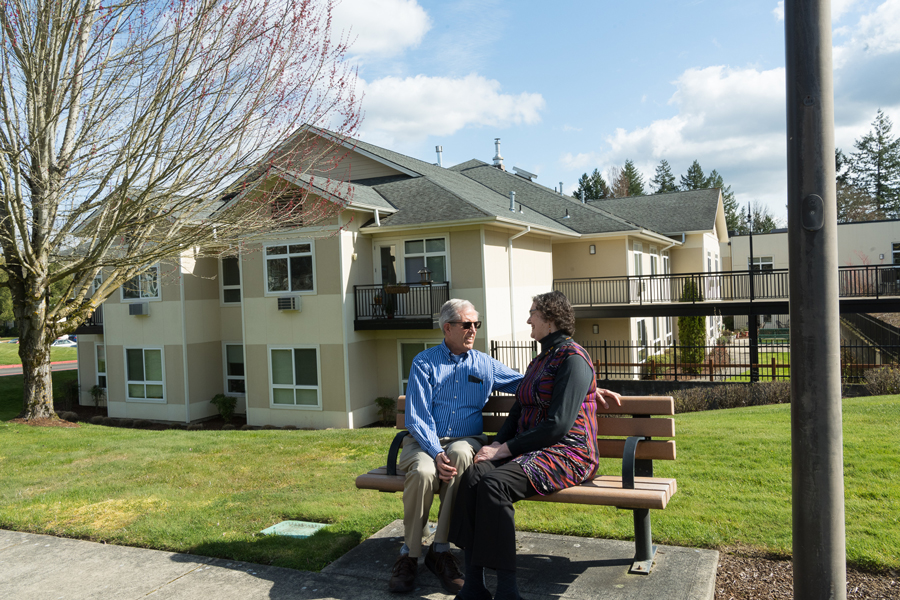Choosing a retirement community isn’t a simple decision. You can’t just throw a dart at a map and hope for the best. At Friendsview, we’re fond of saying successful aging takes planning. And it’s not just about planning financially — it’s also crucial to know what you’ll do if you become unexpectedly ill or have a major accident. It’s about finding an independent living community that matches your needs and desires for the next 20-30 years. Like many plans, it all starts with asking the right questions.
Here are 7 questions we consider vital in choosing a retirement community that best suits you:
What is their reputation within the greater community?
For restaurant reviews, you might go to Yelp and read about its reputation. With retirement communities, it takes a little more effort to ascertain their true standing in the larger community. Here are some factors to consider:
- Find out how long the senior living community has been open and how many owners have bought or sold it. If it’s had several owners, that can mean inconsistency or lack of stability for residents.
- Learn if the leadership and governance is local or at a corporate office across the country. Find out who makes big decisions that affect residents’ lives, especially when it comes to changes in services.
- Is it a not-for-profit or for-profit organization? This can make a big difference in the community’s values and how they’re perceived in the local area.
- Ask if there has been steady growth and financial stability over the last decade. Considering their financials is just as important as figuring out your own.
- Search for online ratings (on other sites) for outstanding health services posted by family members.
A community’s reputation is important. It can mean the difference between making your choice with confidence as opposed to uneasily hoping for the best.
If I experience a health incident, where and how will I receive care?
Many active seniors view themselves as healthy agers who won’t need assisted living or other care. But according to the U.S. Department of Health and Human Services, up to 70% of people over the age of 65 will need long-term care at some point in their lives. So what if something does happen? Do you have a plan for accidents or unexpected health concerns? When doing your research for your forever home, it’s important to look at what your needs will be not only in your 60s and 70s, but also in your 80s and 90s. As you visit different locations, ask about their quality of support and levels of care or living. CarePredict teaches that there are five main types of communities with differing levels of care:
- Age-restricted communities (55+)
- Independent living communities
- Life Plan Communities (also known as a Continuing Care Retirement Communities)
- Assisted living communities
- Nursing homes or skilled nursing facilities
It’s important to note, not all communities offer all levels of care.
In the most comprehensive scenario of a Life Plan Community, you’ll have access to a full continuum of care at the same setting where you live independently. Thus, if the occasion arises, you’ll avoid the need to seek care and move during a vulnerable time. This also means your plan is already in place, with no need for family to make decisions on your behalf.
The hope is that you’ll remain in good health, but have a plan in place for life’s what-ifs.
What happens if I outlive my resources and run out of money?
Say you do remain healthy for the next decade and the next one after that and the next one after that. That’s terrific, of course. But unlike the costs of living, financial resources are finite. What are your options if you begin to outlive your nest egg? It’s one of the most important questions to ask when researching retirement places:
Will you evict me if I run out of money?
This is a yes or no question. Most not-for-profits have resident assistance funds (sometimes called a “benevolent clause”) for these types of situations, and will never ask you to leave simply because you’ve exhausted your resources.
At a for-profit community, chances are higher that if you run out of funds you’ll be asked to leave. Again, it’s an important question to ask before making your senior living decision.
Is there a focus on wellness with a diverse program of events and activities?
Dictionary.com defines “wellness” as “the quality or state of being healthy in body and mind, especially as the result of deliberate effort.” It’s easy to think of the body when you hear the word wellness. But we can’t forget the “and mind” part.
When researching senior living communities, ask about their approach to wellness for your entire person — physical, mental, emotional and spiritual. Find out if they have any of the following:
- Physical education — Exercise classes for all levels, personal coaching to reach physical goals, additional resources for self-led exercise, excursions that encourage physical activity, access to local businesses that help you meet physical wellness desires
- Lifelong learning options — Can include guest speakers on interesting topics, partnerships with local universities for auditing classes and using libraries, in-house publications that promote intellectual stimulation
- Volunteer opportunities — Either internal at the senior living community or within the local area
- Dining — Look for a dietitian on staff, options for special dietary needs and locally grown, seasonal produce
- Art, woodworking and more — Accommodations for your hobbies artistic pursuits and interests, either on campus or available within walking distance
- Spiritual life — What resources are available to meet spiritual needs? Can include chaplains, local religious partnerships, affiliation with a particular faith, and easy access to educational Christ-centered materials.
What are my options for floor plans and neighborhoods?
Whether you’re looking for a studio or something bigger such as a two-bedroom home with an office, it’s always good to have options. Keep in mind, your needs may change over time. Before spring 2020, you could tour those homes in person, but for now you may have to settle for a virtual tour. Pay attention to staging and lighting, as you would when buying any new home. Don’t just look at the inside though. Sometimes there are different neighborhoods within the same community, each with its own distinctive personality. Take note of those that appeal to you most.
Is the community resident-led?
If this is a new term for you, here are some great ways to define what it means to be resident-led:
- A resident-led community gives a voice to the residents no matter what they’re saying. Their concerns and suggestions are considered inherently legitimate and are implemented to improve the community.
- Resident-led communities will have a strong resident association and resident council with representation from all the buildings/neighborhoods. A resident council member is permitted to take part in board of director meetings and/or the occasional staff meeting.
- Interest groups led by residents should help influence decisions that affect the entire community. Residents are free to form interest groups and invite other residents and staff to join.
Experts tell us that the more engaged you are in your retirement years, the happier you’ll be and the longer you’re likely to live. Resident-led communities are a positive step in that direction.
Do the mission and values complement mine?
Every community will have a mission statement, probably posted on their website. Take a moment and think about what their statement means to you and if it resonates. Communities will also share the values that guide their operations, especially as it relates to residents and employees. At Friendsview, we consider these our top 8 values: integrity, stewardship, compassion, community, excellence, dignity, service and Friends Heritage. While only half of our residents are Quaker, it’s important for all potential new neighbors to be aware of our Friends Heritage and other values. A full understanding of the guiding values is an important step toward a happy future in a community where you’ll feel comfortable.
Finding Out What’s Important to You…
We’ve discussed several questions and shared topics to consider when when choosing a retirement community. What we don’t know is what you value. What’s most important to you and your loved ones when choosing your future home? Maybe you don’t know yet either. Well, we can help.
Download our free 5-step guide to finding your ideal senior living community. Or plan for your future at Friendsview by filling out an application to be on our intent list.

Nikki Deckon has been on staff at Friendsview since 2018 in various roles and in long term care for several years. Before working with seniors, she wrote/produced hundreds of talk radio programs and vignettes; was published in a couple of editions of Chicken Soup for the Soul and other print publications including The Oregonian, Kids NW, The Sun and more. After twenty years of marriage she feels that she’s still in the “honeymoon” phase and is enjoying raising her teenage boys in Newberg, a mere two miles from Friendsview.









